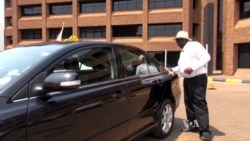As the African continent rapidly urbanizes, cities are swelling into megacities and a new problem is rearing its ugly head: traffic.
U.N. Habitat, the U.N. agency for human settlements, says urbanization rates reached 40 percent in Africa in 2010, and are projected to reach 60 percent in 2050.
Johannesburg taxi driver Abner Mamabolo knows this all too well. In the three years that he’s been driving around the Sandton business district in the heart of Africa’s economic hub, he’s seen the effect of this growth and rising prosperity.
“The traffic was increasing in the last few years,” he told VOA News as he downshifted to a stop in the middle of Sandton traffic. “It looks like we’ve got more cars, people are buying more cars.”
He says it often takes him an hour to get from home to Sandton, a distance of just 15 kilometers.
Sandton facelift
But those usually crammed downtown streets are getting a major makeover for this month’s EcoMobility Festival.
For all of October, city officials are restricting traffic in the area to promote environmentally friendly transport options. The hope is that commuters will use their feet to get into the city or at least take a bus or a train.
Johannesburg’s mayor, Mpho Parks Tau, says the initiative is going well. More importantly, he told VOA, his city is trying to set an example for other African cities and have something to give at this year’s United Nations Climate Change Conference.
This year’s conference in Paris is a chance for countries to talk about how they are tackling climate change and pollution and to set goals.
“Johannesburg has been able to take a bold step and bold action to deal with mobility and climate change under our own roof, and said that we can do it, and we can do it in a bold way,” he said.
The bigger picture: Planning
But transport experts say reducing road access will not solve Africa's traffic problems. Urban planner Amanda Ngabirano says many African cities, like her hometown of Kampala, Uganda, were poorly planned.
“The main challenge we have in Kampala is poor and inefficient public transport,” she told VOA. “And we also don’t have facilities for walking, for cycling. We don’t have an integrated system of mobility.”
That’s because when African cities began to grow, they looked not toward Europe’s transit-friendly street plans, but towards America’s suburban, car-friendly sprawl. That, says Sunny Kodukula, the global coordinator for EcoMobility, is something that could take decades to undo.
In the meantime, he says, public transport options need a makeover, too. For decades, prosperity in African cities has meant escaping from taxi-vans and motorbikes to getting your own car.
“Public transport does not have the image it should have for people to shift from cars to public transport,” he said. “People in African cities think public transport is poor, or not attractive enough for them to shift. And there comes the status symbol.”
Mamobolo, the taxi driver, says less traffic has made his job easier this month, and he notes that Johannesburg has more car-free options than ever.
“Since they started this (festival), I see we’ve got less cars,” he said.
For more of Africa’s urban dwellers, traffic is a reality of life in the big city. But experts say that needs to change. And it can, they say, one bus ride, one bicycle, one step, at a time.





